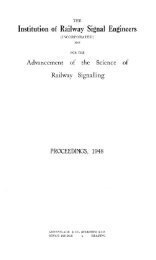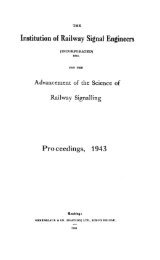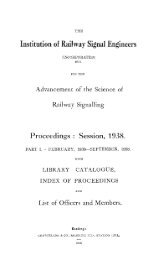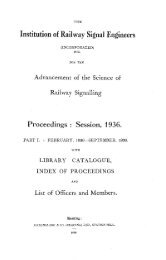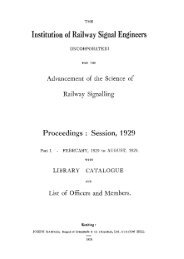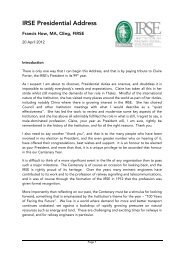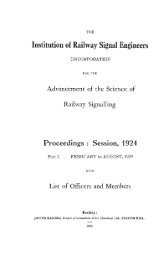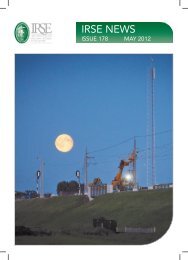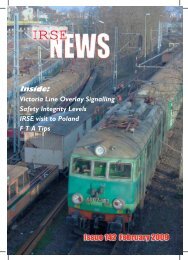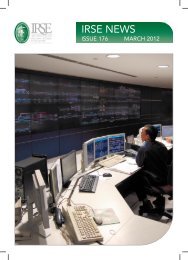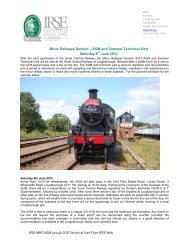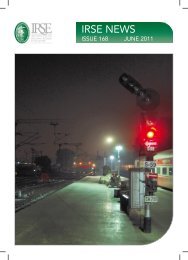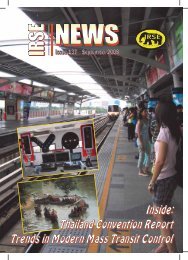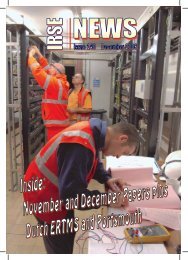IRSE NEWS 167 May 11 with Watermark.pdf
IRSE NEWS 167 May 11 with Watermark.pdf
IRSE NEWS 167 May 11 with Watermark.pdf
Create successful ePaper yourself
Turn your PDF publications into a flip-book with our unique Google optimized e-Paper software.
PRESIDENTIAL ADDRESS<br />
IMPROVING GLOBAL REACH<br />
During 2010/<strong>11</strong> we have made a number of changes, including<br />
inviting more feedback and participation from Country Vice<br />
Presidents and Section Chairmen. This will continue this year.<br />
<strong>IRSE</strong> <strong>NEWS</strong> now has an Editor in Australia and plans to include<br />
other Editors around the world, in order to present more<br />
balanced international content. I hope that we will begin to<br />
see themed editions of the <strong>IRSE</strong> <strong>NEWS</strong> <strong>with</strong> international<br />
debate about a topic.<br />
We have introduced <strong>IRSE</strong> on-line and in 2010 members had<br />
the opportunity to pay subscriptions and order publications via<br />
the web. Supported by the Australasian section we have<br />
followed their lead in making <strong>IRSE</strong> News, papers and<br />
presentations available on line through the members’ area of<br />
the website. In 20<strong>11</strong> the web site will be developed further to<br />
improve navigation, give sections the opportunity to update<br />
their own pages, provide the infrastructure for discussion<br />
forums and make synopses of <strong>IRSE</strong> papers searchable.<br />
We started a review of the membership package and<br />
funding mechanisms in 2010, to look closely at how member’s<br />
subscriptions are spent and whether this constitutes good value<br />
for money for all of our members. This has included a review<br />
<strong>with</strong> the sections to ensure that they are appropriately funded<br />
to deliver services to members locally. In addition,<br />
approximately 10% of our members live in a location where<br />
there is no local section, so they must also receive value for<br />
money from their subscriptions.<br />
This work is still progressing, guided by Council and will be<br />
concluded in the Autumn of 20<strong>11</strong>. We are discussing the<br />
option of introducing a new e-membership, where for a<br />
reduced subscription rate, members could elect to receive <strong>IRSE</strong><br />
material, electronically. This will involve making some key<br />
changes to the <strong>IRSE</strong>’s infrastructure and support services.<br />
These changes will move us towards making lower costs<br />
subscriptions available across the world and hopefully<br />
encourage more younger people to join the <strong>IRSE</strong>.<br />
RELEVANCE OF THE INSTITUTION TO<br />
THE RAILWAY SECTOR<br />
NOT FOR RE-PRINTING<br />
During the year meetings have been held <strong>with</strong> a number of<br />
industry stakeholders to seek their views of the <strong>IRSE</strong>. The<br />
feedback highlighted the need for the <strong>IRSE</strong> to be an<br />
organisation that is looking to the future and helping its<br />
members to understand and gain maximum benefit from new<br />
technology. In particular, the industry stakeholders wanted<br />
help from the <strong>IRSE</strong> during times of change, for example in<br />
helping members move from traditional signalling<br />
competencies to working in the on-board environment <strong>with</strong><br />
ERTMS or Computer Based Train Control (CBTC).<br />
The licensing scheme was a topic of much discussion, <strong>with</strong><br />
many still considering that the scheme had a vital role to play,<br />
but some feeling that more flexibility could assist industry. As a<br />
consequence we are in the process of launching a strategic<br />
review of the scheme.<br />
©<br />
We are developing a Company Affiliation scheme, <strong>with</strong> the<br />
objective of developing closer relationships between the <strong>IRSE</strong><br />
and industry. Draft proposals are currently being consulted<br />
<strong>with</strong> the sections and we hope to see this scheme<br />
implemented in 20<strong>11</strong>.<br />
If the <strong>IRSE</strong> is to remain relevant to the railway sector it<br />
needs to be able to anticipate the changes in the sector and<br />
respond better. I’d like to move onto talking about some of<br />
the factors which I think will influence the sector and explain<br />
how the programme in 20<strong>11</strong>/2012 will address these.<br />
CHANGES IN THE ENVIRONMENT<br />
Major Cities<br />
Recent years have seen a trend towards urbanisation <strong>with</strong><br />
more than half the world’s people now living in cities. There<br />
are currently 26 cities <strong>with</strong> over 10 Million inhabitants. The<br />
largest City in the world now has over 34 Million inhabitants.<br />
It’s difficult to imagine that many people, it’s the equivalent of<br />
London, Paris and Washington combined.<br />
By 2050 the UN are forecasting that 70% of the world will<br />
be urban dwellers. Mega Cities are forecast to grow into<br />
Mega regions as the cities sprawl into one another.<br />
Recent years have seen significant investment in metros<br />
and commuter rail operations in these cities <strong>with</strong> many more<br />
schemes in the planning process, proceeding to construction<br />
now. In Asia/Pacific and Africa/Middle East only a minority of<br />
major cities have mass transit systems. The UNIFE World Rail<br />
Market Study: Status Quo and Outlook 2020 shows the<br />
potential for 268 new urban rail systems in these regions.<br />
Maximising the performance of the railway infrastructure in<br />
these major cities and between the cities will be a challenge<br />
for our members in years to come. I believe that the<br />
boundaries between mainline and urban technologies will<br />
begin to blur as both sectors move towards on-board systems<br />
and focus on the challenge to maximise the capacity of their<br />
infrastructure.<br />
During the year we will have two technical papers in this<br />
area. The first will be about the Thameslink project in London<br />
and discuss the issues of Automatic Train Operation <strong>with</strong><br />
ETCS. The second will be about Crossrail in London and the<br />
RER in Paris and will include the CBTC or ETCS debate. They<br />
will both address the issue of maximising capacity through<br />
major cities.<br />
We are fortunate to be able to visit Singapore and Kuala<br />
Lumpur as part of this year’s convention. Singapore has the<br />
challenge of supporting a growing population of over 5 Million<br />
<strong>with</strong>in a very limited land area of 43 km by 23 km. The LTA<br />
MasterPlan, published in 2008, set out a vision for 2020 that<br />
included investments of over $20Billion and doubling the rapid<br />
transit system from 138 km to 278 km. These plans are now<br />
well underway and we will have the opportunity to visit many<br />
of the new developments during the convention.<br />
Back in 2007, Alan Fisher talked of a two centre convention<br />
in Kuala Lumpur and Thailand, <strong>with</strong> a train journey between the<br />
two. This was a great idea until the train timetable was<br />
4<br />
<strong>IRSE</strong> <strong>NEWS</strong> | ISSUE <strong>167</strong> | MAY 20<strong>11</strong>



